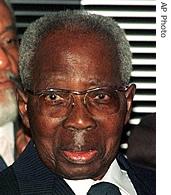2006年VOA标准英语-Senegal Commemorates Its 'Poet President'(在线收听)
By Jordan Davis
Dakar
10 October 2006
This year the French-speaking world has celebrated the life of late Senegalese "Poet President" Leopold Sedar Senghor. He is widely celebrated for his influential writing about panafricanism and African identity beginning in the 1940s. This week Senegal celebrated the 100th anniversary of the independence-era statesman's birth.
-----
 Former Senegalese President Leopold Sedar Senghor (File photo) |
||
Students in a Dakar high school ceremony commemorating Mr. Senghor's birth sang that song.
In classrooms, literature students discussed Senghor's writings about what he termed negritude, or blackness, a staple of the Senegalese curriculum. The poems and philosophical texts urged Africans to take pride in their dark skin, and their culture.
Nasseyni Oumou Diallo says she first learned about Mr. Senghor from her brothers and sisters. Diallo says she particularly liked that Senghor wrote how Africa could be a "promised land."
In the high school courtyard, Senegal's Minister of Culture and National Heritage, Mame Biram Diouf, told students and reporters that the Senghor message is still relevant. Diouf lauded Mr. Senghor's dream of a universal civilization created by blending of races and cultures that would lead to a new humanism for the twenty-first century.
The event was reported on state-run television's evening newscast-where Senegal's poet-president was remembered much more for his literary legacy than as a head of state. He was president for 20 years.
At official ceremonies in Mr. Senghor's childhood home in the coastal town of Joal, the Senegalese government sent a minor official - its minister of postal services and telecommunications.
Senegal's current President Abdoulaye Wade was a longtime rival of Mr. Senghor.
Even some of Senghor's former government ministers have mixed views on his legacy as president.
Assane Seck served in a number of government posts from the 1960s through the 1980s. In his office, lined with yellowing stacks of newspapers dating back decades, he says Mr. Senghor's cultural contributions was his legacy.
Seck says that in terms of democracy, Senghor did not have a perfect track record. He says the former president ran what was essentially a one-party system until the early 1970s when he allowed the creation of four political parties: Communist, Socialist, Liberal, and Conservative.
The law structuring the political landscape was overturned a decade later. Today Senegal has more than 100 political parties. Mr. Senghor's Socialist Party today holds just a small fraction of the country's parliamentary seats.
Though the Senghor brand of African socialism has fallen out of favor for the market-driven economic policies of his successors, Assane Seck credits President Senghor for creating a relatively stable state based on the rule of law.
In 1980 Mr. Senghor did what at the time was something rare for an African leader: he left office voluntarily. When his successor, Abdou Diouf, was beaten in elections in 2000 by current President Abdoulaye Wade, he handed over power peacefully.
Seck says that while Senegal's democracy is not perfect, pointing to concerns about press freedom, he says with a proud smile that Senegal is the only country in West Africa to have avoided a successful military coup in its more than 40 years of independence.
That pride is shared by many Senegalese, who hope presidential elections this February will not mark a break with that aspect of their poet-president's legacy.